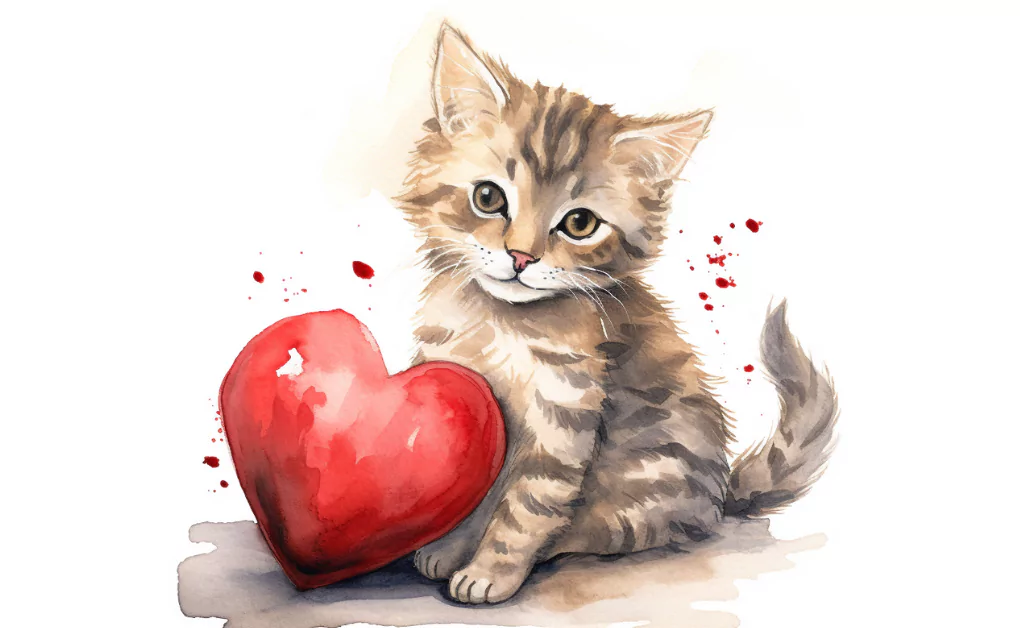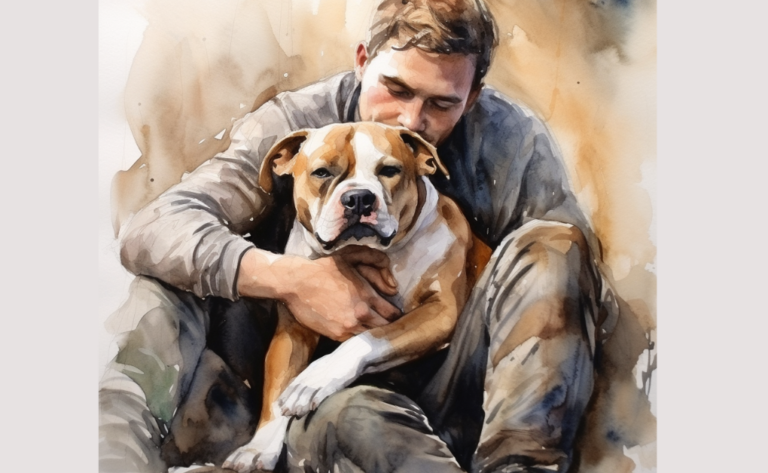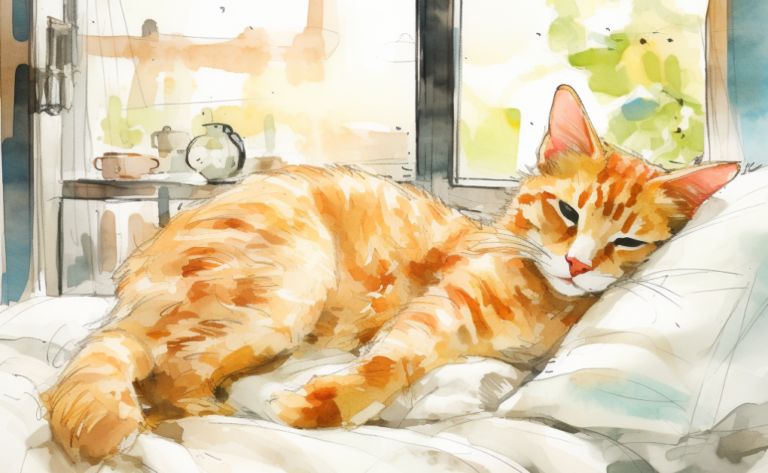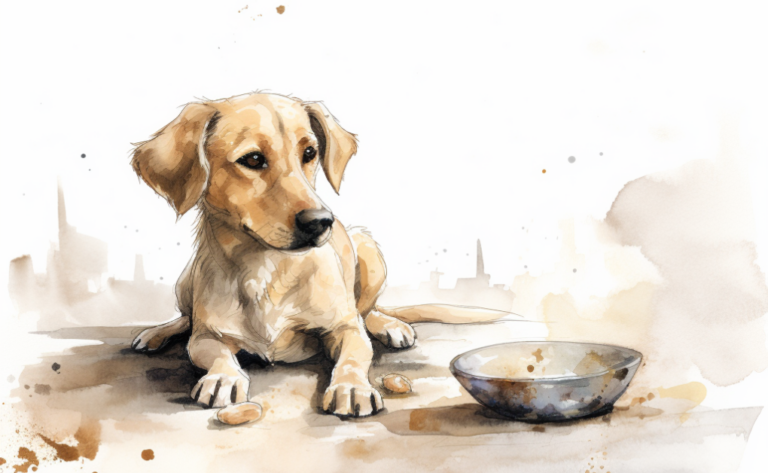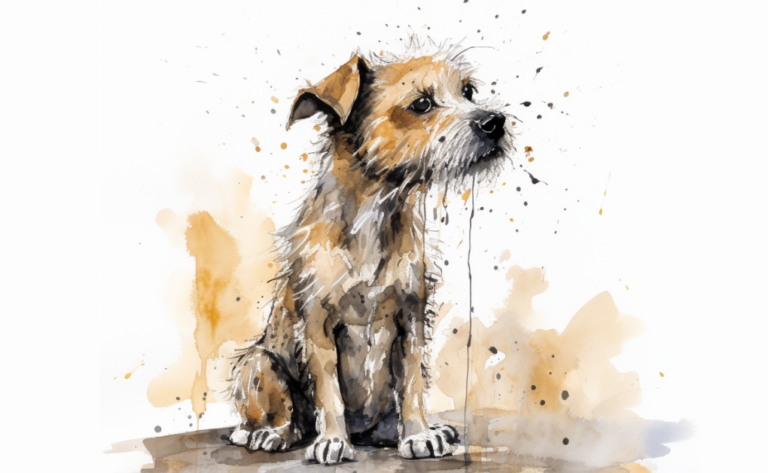What is Heart Disease in Cats?
What is it?
How is it Treated?
Breed Predispositions
Maine Coon Sphynx Ragdoll Persian Siamese Abyssinian Devon Rex British Shorthair Bengal Scottish Fold
Introduction
Milo, an affectionate and playful tabby cat, had always been the center of Emily’s world. However, when Milo started breathing heavily and exhibited reduced energy levels, Emily grew increasingly worried about his well-being. She promptly took him to the veterinarian for a comprehensive check-up. After performing a series of tests, including an echocardiogram, the veterinarian diagnosed Milo with heart disease—a condition that can affect cats of all breeds and ages.
Heart disease in cats, also known as feline heart disease, represents a variety of conditions impacting the cat’s heart and blood vessels’ structure and function. Similar to humans, cats can experience multiple forms of cardiovascular disease that can significantly hamper the heart’s ability to circulate blood throughout the body. When the cat’s heart cannot function at its best, it can spawn diverse health problems and severely affect a cat’s quality of life.
An aspect that requires attention is that a heart murmur in cats or, more severe heart disease can be a silent predator. Many cats do not manifest apparent signs of heart disease until the disease has progressed substantially. This stealthy nature can even lead to a heart disease secondary to another condition or breed-specific issues like in Maine Coon cats. In some cases, it can pose the risk of congestive heart failure or the formation of a blood clot. Therefore, regular veterinary care is vital to detect and manage heart disease in cats and, in certain cases, slow down the heart rate, mitigating the effects of the disease.
Types of Heart Diseases in Cats
Cat heart disease encompasses several types, broadly divided into two categories: congenital and hereditary heart diseases.
Congenital Heart Diseases
Congenital heart diseases refer to structural abnormalities in the heart that arise during fetal development. These malformations can implicate the heart’s interior walls, the valves within, or the arteries and veins responsible for transporting blood to the heart or throughout the body. The common types of congenital heart diseases in cats include:
- Patent Ductus Arteriosus (PDA): This condition involves a blood vessel that typically seals off after birth but stays open, allowing blood meant for the aorta to flow into the pulmonary artery instead. Without correction, this can advance through stages of heart disease to culminate in heart failure.
- Ventricular Septal Defect (VSD): This anomaly is a hole in the septum, the wall separating the heart’s two lower chambers or ventricles. Depending on the defect’s size, it can cause no symptoms or result in signs of heart failure.
- Tetralogy of Fallot: This rare and complex congenital heart defect brings together four abnormalities: a VSD, narrowing of the exit from the right ventricle (pulmonary stenosis), displacement of the aorta over the VSD, and thickening of the right ventricular wall (right ventricular hypertrophy).
- Aortic Stenosis and Pulmonic Stenosis: These conditions signify a narrowing of the heart’s aortic or pulmonic valve, which forces the heart to work harder to pump blood, thickening the heart muscle.
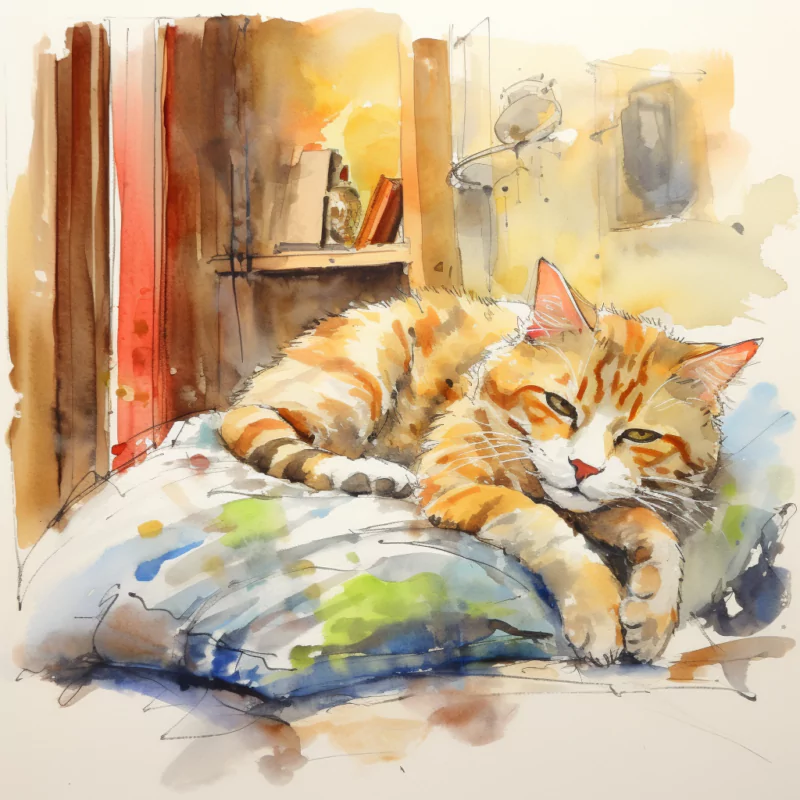
Hereditary Heart Diseases
Hereditary heart diseases are conditions transmitted genetically from parents to offspring. The most prevalent among these include:
- Hypertrophic Cardiomyopathy (HCM): This disease, affecting the heart muscle, is the most common type of heart disease in cats, particularly breeds like Maine Coon and Ragdoll cats. Characterized by thickening of the heart muscle, it can lead to heart failure and other complications.
- Dilated Cardiomyopathy (DCM): Though less common than HCM, DCM, which prompts heart chambers to enlarge and the heart muscle to thin, is also believed to have a genetic link. This condition can progress to heart failure. It has become less common since the discovery that a taurine deficiency could cause DCM, leading to the addition of taurine to cat foods.
- Restrictive Cardiomyopathy (RCM): This less common form of heart disease in cats involves rigid heart walls that impede the heart from properly filling with blood. While it’s unclear if RCM is hereditary, certain breed prevalence raises suspicions.
- Arrhythmogenic Right Ventricular Cardiomyopathy (ARVC): This rare hereditary disease is most often seen in Boxer dogs but has also been reported in cats. It involves a progressive replacement of the heart muscle with fatty and fibrous tissue, which leads to arrhythmias and heart failure.
It’s crucial to differentiate between the terms congenital and hereditary. While all hereditary diseases are technically congenital, being present at birth, not all congenital diseases are hereditary. Some congenital heart diseases could result from factors unrelated to the cat’s genetics during pregnancy, such as maternal illness, exposure to certain medications or toxins, or malnutrition.
Causes of Feline Heart Failure
The genesis of heart disease in cats can be traced back to multiple underlying causes and risk factors, each influencing the disease uniquely. While heart disease can affect any cat, regardless of breed, age, or sex, some cats may be more susceptible due to certain factors.
Genetic Factors
Certain cat breeds have a genetic predisposition to heart disease. For instance, Maine Coon and Ragdoll cats bear genes that can trigger hypertrophic cardiomyopathy (HCM), which causes the heart muscle to thicken. In these situations, the disease is usually inherited, meaning the affected cat is born with the potential for the disease to emerge.
Hyperthyroidism
Hyperthyroidism is a common health condition in senior cats, contributing to heart disease. The excessive production of thyroid hormones in a cat suffering from hyperthyroidism accelerates the heart rate. It can lead to hypertrophy or thickening of the heart muscle, resulting in a heart condition known as hyperthyroid heart disease.
Hypertension
Elevated blood pressure or hypertension can strain a cat’s heart, making it more challenging to pump blood throughout the body. This strain can lead to thickening of the heart’s walls and eventually heart disease if left unaddressed.
Age and Sex
Heart disease is more prevalent in older cats as heart function naturally weakens with age. Certain forms of heart disease, such as HCM, are also more common in male cats than females, although the reasons for this remain unclear.
Nutritional Deficiencies
Particular nutritional deficiencies, notably in the amino acid taurine, have been linked to the development of dilated cardiomyopathy (DCM), a type of heart disease in cats. Nowadays, commercial cat foods are fortified with enough taurine to prevent this. However, cats fed homemade diets or dog food might require additional taurine. A taurine deficiency can lead to a condition where the heart enlarges due to the weakening the heart muscle.
Infections
Certain infections, especially those brought on by bacteria or parasites, can impact the heart, resulting in inflammatory heart disease. For example, Feline infectious peritonitis (FIP) can incite a form of inflammatory heart disease.
Each of these causes contributes differently to heart disease, but they all ultimately damage the heart muscle and impair its ability to pump blood effectively. As the disease advances, cats may begin to show signs of distress. Comprehending the various causes of heart disease enables pet owners to implement preventive measures, thus reducing their cats’ risk.
Symptoms of Heart Disease in Cats
Surprisingly, cats are quite susceptible to heart disease, with approximately 15 percent of the population affected. Heart disease tops the list as a leading cause of mortality among cats and is also the predominant cause of death in dogs.
The clinical signs of heart disease in cats can vary significantly. They might include the following:
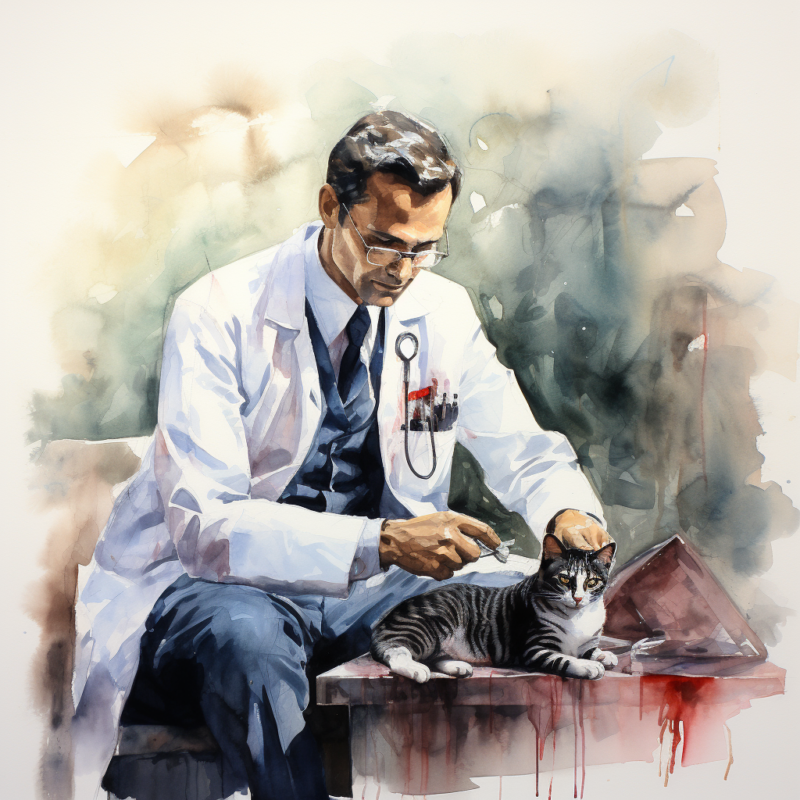
- Difficulty breathing or experiencing shortness of breath, possibly due to pleural effusion, a condition where fluid accumulates around the lungs.
- Rapid or irregular heartbeat could indicate a severe heart problem.
- Lethargy or weakness, potentially indicating decreased blood flow due to the heart’s impaired ability to pump blood efficiently.
- Loss of appetite or weight loss, a common symptom in cats suffering from heart disease.
- Fainting or collapsing, possibly due to blood clots, is a dangerous complication of heart disease in cats, especially in breeds like Maine Coon cats.
These symptoms could also be signs of congestive heart failure, a severe stage of heart disease. Therefore, seeking veterinary help is crucial if your cat exhibits these symptoms.
Diagnosis of Heart Disease in Cats
Detecting heart disease in cats can be complex due to its subtle symptoms, which often resemble other health issues. However, veterinarians employ various tools and methodologies to identify heart disease.
Physical Examination
Typically, the first step in diagnosing heart disease involves a physical examination where the vet listens to the cat’s heart and lungs using a stethoscope. Hearing abnormal heart sounds, such as murmurs or arrhythmias, could indicate a possible issue with the cat’s heart.
Blood and Urine Tests
While blood and urine tests may not directly detect heart disease, they offer crucial insights into the cat’s overall health and can help rule out other conditions that may be causing the symptoms. Certain blood markers can hint at stress, wear and tear on the heart, or damage to other organs due to heart disease.
Chest X-rays
Chest X-rays are a common diagnostic tool, allowing a visual assessment of the cat’s heart and lungs’ size and shape. Signs of an enlarged heart or fluid around or in the lungs could indicate heart disease.
Echocardiogram
The echocardiogram, or heart ultrasound, is the gold standard for diagnosing cat heart disease. This non-invasive procedure enables the vet to see the heart in motion and evaluate the heart walls’ thickness, the heart chambers’ size, and the heart’s pumping efficiency. This can also help diagnose specific types of heart disease like hypertrophic cardiomyopathy.
Electrocardiogram (ECG)
An electrocardiogram (ECG or EKG) measures the heart’s electrical activity and can detect irregularities in the heart’s rhythm and rate, which can be symptoms of heart disease.
Blood Pressure Measurement
As high blood pressure can be both a potential cause and a consequence of heart disease, measuring a cat’s blood pressure provides valuable insights.
Cardiac Biomarker Tests
Recent advancements in veterinary medicine have introduced tests for certain biomarkers, such as N-terminal pro-B-type natriuretic peptide (NT-proBNP). These markers at elevated levels in a cat’s blood can suggest heart disease.
Each of these diagnostic methods offers essential information in diagnosing and managing heart disease in cats. Understanding these methods can be invaluable for cat owners, helping to ensure their pets receive the most effective treatment for their heart condition, whether it’s adult-onset heart disease or a congenital issue.
Treatment Options for Heart Disease in Cats
Cat heart disease can be intricate and often require a comprehensive approach. The ultimate aim is to enhance the cat’s quality of life by minimizing symptoms, decelerating disease progression, and handling complications. The specific strategy for treatment will hinge on the nature and severity of the heart disease. Here are some common types of treatment:
Pharmaceutical Treatment
Pharmaceutical treatment often serves as the foundation for managing feline heart disease, with different medications performing various roles in managing heart disease.
- Diuretics, such as furosemide, aid in eliminating surplus fluid that amasses in or around the lungs due to heart failure.
- Beta-blockers and calcium channel blockers decelerate the heart rate and decrease the heart’s workload. These are often employed in cats with hypertrophic cardiomyopathy, an abnormality of the heart muscle.
- ACE inhibitors and angiotensin receptor blockers (ARBs) can help reduce blood pressure and decrease fluid buildup, aiding heart function.
- Antiplatelet drugs like aspirin or clopidogrel might be prescribed to avert the formation of blood clots, a common complication of heart disease.
While medication cannot cure heart disease, it is instrumental in managing symptoms and enhancing the cat’s quality of life.
Dietary Management
For cats with heart failure, dietary changes may be advised. A diet low in sodium can help reduce fluid retention and lower blood pressure. A veterinary cardiologist may also recommend a diet high in taurine, a crucial amino acid for heart function.
Regular Monitoring
Frequent follow-up appointments will be necessary to monitor the progression of the disease and adjust treatment as needed. This could involve recurring physical examinations, blood tests, and imaging studies like echocardiograms.
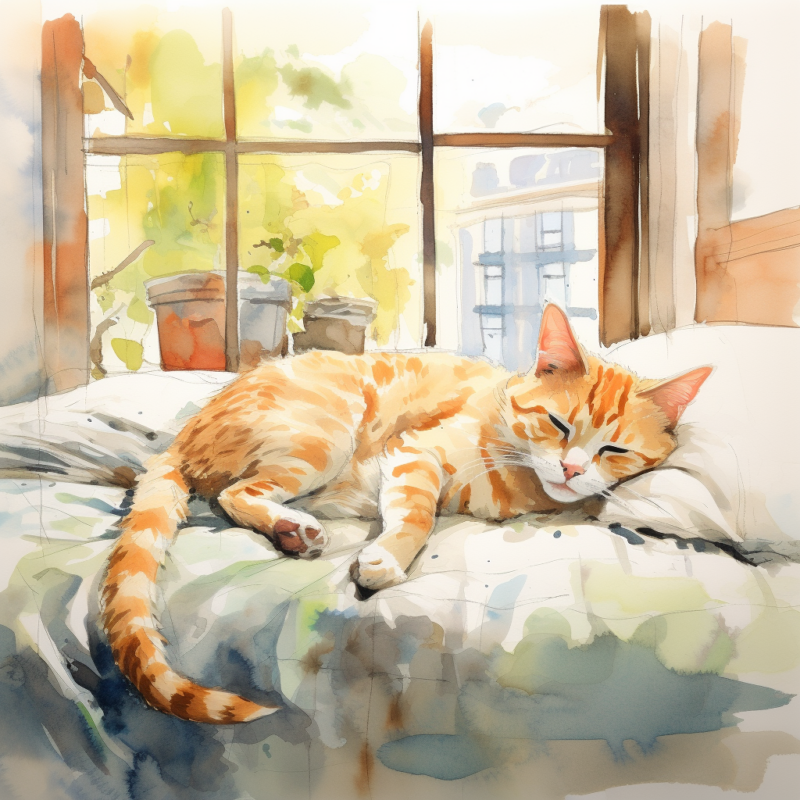
Surgical Intervention
Surgery may be an option for some cases, especially congenital heart defects. However, it’s less commonly utilized for acquired heart disease in cats due to the risks involved. Procedures like pacemaker implantation can be beneficial in certain scenarios.
Supportive Care
Alongside medical treatment, supportive or critical care can be pivotal in managing feline heart disease. This can encompass strategies for stress reduction, maintaining a healthy weight, and keeping the cat indoors to avoid strenuous activity.
The treatment of cat heart disease is personalized to each cat’s needs and generally involves a long-term commitment. Working closely with your vet is vital to devise the best possible treatment plan for your cat, regardless of the severity of the disease. However, cat owners must remember that some changes to the heart muscle are irreversible, and ongoing monitoring and care are essential.
How to Prevent Heart Disease in Cats?
Preventing heart disease in cats involves addressing the factors that can be controlled. Here are several ways to help prevent heart disease in your feline companion:
Regular Veterinary Check-ups
Regular vet check-ups are an essential part of preventive health care for cats. Routine examinations allow your vet to monitor your cat’s overall health and detect signs of heart disease early on, when it’s typically easier to manage. Regular check-ups typically include a physical examination, blood tests, and sometimes imaging studies such as radiographs or an echocardiogram.
Balanced Diet
A balanced diet is crucial for maintaining overall health and preventing heart disease. Some heart conditions, like dilated cardiomyopathy, have been linked to nutritional deficiencies, specifically taurine. Therefore, feeding your cat a diet specifically formulated for felines is important, containing the necessary taurine levels.
Maintain a Healthy Weight
Obesity can contribute to many health problems, including heart disease. Maintaining a healthy weight can help prevent these issues. Regular exercise and portion control are key aspects of weight management.
Regular Exercise
Regular, moderate exercise can help maintain a healthy weight and promote cardiovascular health. However, it’s important to remember that cats with heart disease shouldn’t be encouraged to exercise excessively, as this can strain the heart.
Avoid Known Risk Factors
If possible, avoid breeding cats with known hereditary heart diseases. Genetic predisposition plays a role in some forms of heart disease, such as hypertrophic cardiomyopathy.
Regular Parasite Prevention
Heartworm disease, caused by a parasite spread by mosquitoes, can cause serious heart and lung disease in cats. Regularly applying preventative medication can protect your cat from this disease.
Limit Stress
Chronic stress can contribute to various health problems, including heart disease. Provide a stable, calm environment for your cat and avoid sudden changes in their routine whenever possible.
Avoid Exposure to Toxins
Some substances, like certain medications or toxins, can harm the heart. Only give your cat medications as directed by your vet, and keep potential toxins out of reach.
Prevention of heart disease in cats often comes down to providing them with a healthy lifestyle and getting them regular veterinary care. If heart disease is detected early, there’s a better chance of managing the disease and improving the cat’s quality of life.
Frequently Asked Questions
Disclaimer: The information provided on this veterinary website is intended for general educational purposes only and should not be considered as a substitute for professional veterinary advice, diagnosis, or treatment. Always consult a licensed veterinarian for any concerns or questions regarding the health and well-being of your pet. This website does not claim to cover every possible situation or provide exhaustive knowledge on the subjects presented. The owners and contributors of this website are not responsible for any harm or loss that may result from the use or misuse of the information provided herein.

